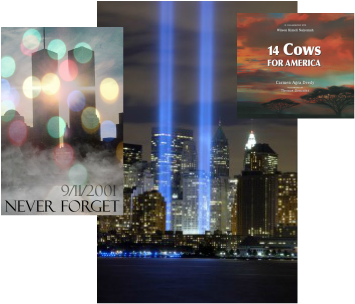"Managing difficult emotions in the classroom requires preparation, particularly when many teachers have lived through the difficult history they are now teaching."
This article is a repost from story originally published by Natasha Robinson, Chalkbeat .
How should the U.S. teach about slavery? Here’s how other countries face their most shameful chapters.
Natasha Robinson, Chalkbeat Tennessee
I first learned about the Holocaust when I was 14. My overwhelming response was relief: relief that I was not German. How, I wondered, could any German cope with knowing that their nation — even their ancestors — had attempted to exterminate European Jews, murdering 6 million of them in the process?
The irony is, of course, that I am British. Yet it wasn’t until I moved to Cape Town a decade later that I was confronted with what is common knowledge to most Southern Africans: Britain’s violent seizure of Xhosa land in the early 1800s, its import of enslaved people to the Cape, the capturing and sexual exploitation of San women and children to reduce its labor shortages, and the introduction of concentration camps in which 50 percent of the Boer child population perished. Nothing in my education had prepared me for this. If learning about your difficult history is uncomfortable, try the realization of ignorance; I assure you, it’s worse.
All this is to say that if you close your eyes and spin the globe, guaranteed your finger will land on a country with a shameful past that endures. The United States, with its history of atrocities from slavery to the slaughter of Native American peoples, is no different. The legacy of those horrors is still very much with us. What distinguishes societies, however, is the extent to which they confront and address their difficult history. The Germans call it Vergangenheitsaufarbeitung, the process of coming to terms with the past.
But how to do Vergangenheitsaufarbeitung? This is a question that many countries struggle with, particularly when deciding whether, how, and when to teach difficult histories. In the United States, for example, controversy has surrounded current attempts to ban certain conversations regarding America’s shameful past, especially as it relates to slavery and its legacy. While no country has it quite right, there are nations whose experience teaching about their own shameful pasts can prove instructive. Here are some lessons:
South Africa, Canada, and Germany all mandate the teaching of history that they know will cause discomfort. Holocaust education in Germany has been mandatory since the early 1990s. In South Africa, the slave trade, colonialism, and apartheid are taught in Grade 7, 8, and 9, respectively. As of 2015, following the Truth and Reconciliation Commission recommendations, several Canadian states have made it mandatory to teach the history of “residential schools,” where indigenous children were abused and thousands died.
Making difficult subjects mandatory is important because it results in resources and teacher training and because it gives teachers permission to tackle emotionally charged subjects. It helps when engaging with emotion in the classroom becomes normalized and therefore anticipated by students and parents. The UK Historical Association, for example, notes that emotional engagement is evidence of effective teaching of controversial issues. Professor Michalinos Zembylas further argues that discomforting feelings are essential for individual and social transformation since they are involved “in challenging dominant beliefs, social habits, and normative practices that sustain social inequities.”
Managing difficult emotions in the classroom requires preparation, particularly when many teachers have lived through the difficult history they are now teaching.
At its most basic, teachers need preparation to feel secure in their content knowledge before they can engage dynamically with students’ emotions. In Canada, most teachers did not learn about residential schools when they were students, and huge efforts have been made to provide resources and training. The work of organizations like the First Nations Education Steering Committee in British Columbia, or the First Nations, Métis & Inuit Education Association of Ontario, for example, have been invaluable in this regard.
In South Africa, teachers are explicitly trained to facilitate difficult conversations. While a guest lecturer at the University of Cape Town, I frequently observed teachers discussing what students were likely to find distressing about apartheid and how to manage that distress in a way that was educationally valuable while avoiding trauma. Organizations like Shikaya also bring racially diverse groups of teachers together in workshops so that they can unpack their own experiences of apartheid, before teaching about apartheid to students.
Alan McCully, a history teacher educator in Northern Ireland, advocates for teacher training to include experiencing discomfort. “You cannot teach controversial history, difficult history, unless you have felt the discomfort of being taught that sort of history yourself,” he argues. “It’s about turning that sort of emotional dimension into something that is more creative and which allows young people to get beyond the simple study of the past in a dispassionate way to recognize that history can have an influence on their current thinking, and can help them to progress as individuals.”
There is a recognition that every student will have a different relationship with the past; it’s not always possible to predict what students will find most distressing. When one size does not fit all, teachers need to feel empowered to do what is right for their classroom, and this requires preparation.
Embracing the discomfort of difficult history does not necessitate diving straight into the graphic violence of the past. There are many ways curricula and teachers facilitate softer introductions that lay the framework for a deeper understanding later on.
In Hamburg, for example, students are introduced to the Holocaust through novels. In Grade 6, they read “When Hitler Stole Pink Rabbit,” covering the most basic understanding that Hitler “took away” the Jews from Berlin. Only later do they discuss more graphic content. In Canada, some teachers find that conversations around the loss of indigenous languages are a good place to start when learning about the horrors of residential schools.
In South Africa, the Holocaust is used as a “bridge” to learning about apartheid. By teaching young South Africans a difficult history in a context emotionally removed from their own, they are better prepared to study a difficult history closer to home. Thus, the curriculum facilitates the opportunity to practice having difficult conversations about culpability, victimhood, and complicity in a more abstracted form before discussing apartheid.
When to teach difficult history is a matter of debate. Even among those who advocate the pedagogical use of discomfort, there are concerns about the age at which students can appropriately engage with human suffering. Museum educators often recount primary school groups who laugh at visual depictions of atrocities. On the other hand, I once interviewed a South African student who had recurring nightmares about apartheid.
In Ontario — and soon Alberta — students begin to learn about residential schools in Grade 4, in British Columbia, it’s Grade 5, and in Saskatchewan, it’s Grade 6. However, many other provinces and territories don’t begin actively engaging with the history and legacy of residential schools until high school. Scholars like Gabrielle Lindstrom, an educational development consultant at the University of Calgary, argue that learning about residential schools should begin as soon as kindergarten. “By the time kids are in Grade 5,” she noted, “they’ve already learned a history of Canada that is based in settler colonial views.”
In Germany, the debate about when to teach followed the country’s reunification in 1990. In the end, it was decided that the Holocaust should not be taught in primary schools. Decision-makers were concerned that children would either not understand the Holocaust, would be traumatized by it, or both. But researchers like Isabel Enzenbach suggest that the Holocaust is often unofficially taught much earlier. This is because the topic is essentially unavoidable. The Holocaust Museum sits at the center of Berlin, and tens of thousands of small brass plaques — called “stumbling stones” — commemorate where Nazi victims lived before they were deported. In a culture so deeply informed by its history, it’s not surprising that children bring their questions to class.
In South Africa, difficult history is left until secondary school, but preparation starts much earlier. Primary school students learn about the ancient African kingdoms of Mali and Mapungubwe. The rationale? You can’t appreciate what is gone if you don’t know what existed in the first place.
Those who wish to explore the uncomfortable past are sometimes accused of hating their country. In post-war Germany, the young people who insisted on talking about the Holocaust were called Nestbeschmützer, or “nest-foulers.” Yet facing the discomfort of the past can reflect and create deep national self-assurance. The philosopher Susan Neiman compared it to having a grown-up relationship with your parents. “As a kid, you believe everything they tell you,” she explained, “As an adolescent, you may be inclined to reject everything. But having a grownup view involves sifting through with some distance, and saying, ‘O.K., I’m glad that my mother had those values, and that’s what I’m going to pass on to my kids. Not the other stuff.’”
Today, South Africa, Germany, and Canada see the recognition of their pasts as being key to understanding who they are in the present. In South Africa, for example, the history curriculum explicitly states that the purpose of history is to explain and encourage the values of the South African Constitution and to learn to raise current social concerns; young people need to “sift through” the extraordinary injustices of colonialism and apartheid to learn to value who they are and understand how to protect the values of the South African constitution. In Germany, historical redemption is seen as a national project. Many outside of Germany see Germany as a model for how to face up to the past.
Still, none of the examples mentioned are perfect in their approach to Vergangenheitsaufarbeitung, and comparing histories can be difficult. Even when abusive governments are defeated — as in the case of Germany and South Africa — the legacies of these pasts continue.
But one thing stands out in all three examples; difficult history is not used to stifle the present with remorse. Instead, it becomes a tool to think about how the future can be better. In this regard, we can all learn something from Susan Neiman: “Shame can be the first step toward responsibility, and with that, toward genuine national pride.”
Natasha Robinson, Ph.D. is a research fellow at the University of Oxford, Department of Education. She researches how history is taught in societies that have experienced violence or injustice. Her forthcoming book is entitled “History Education for Transitional Justice: Learning Legacies.” Robinson and her colleagues have launched a podcast series on teaching controversial history, covering the Holocaust, race, migration, empire-building, and The Troubles in Northern Ireland.
Chalkbeat is a nonprofit news site covering educational change in public schools.




 RSS Feed
RSS Feed